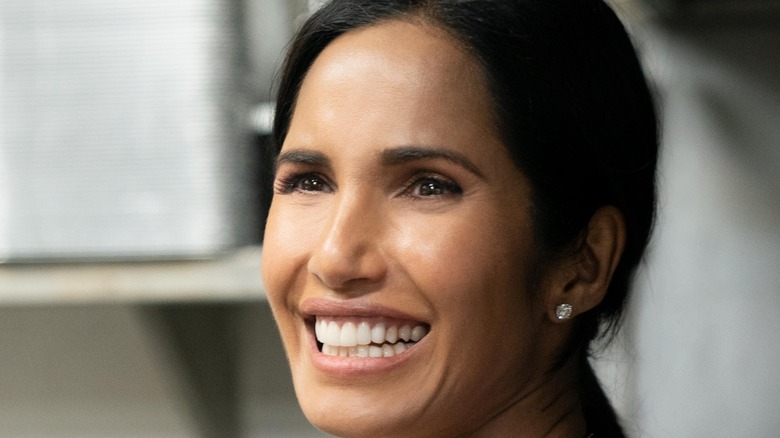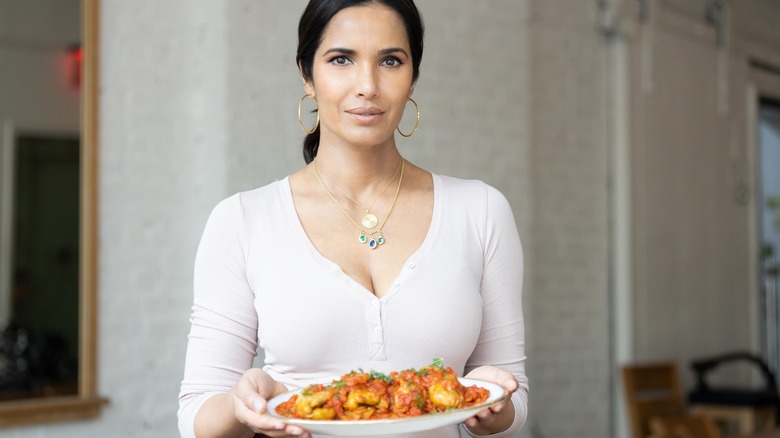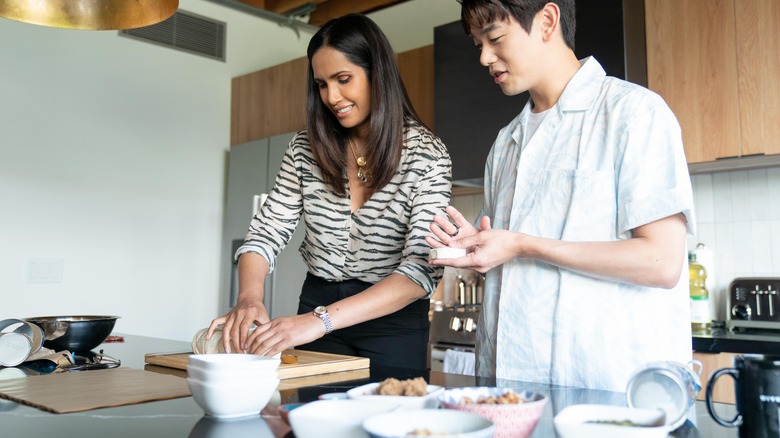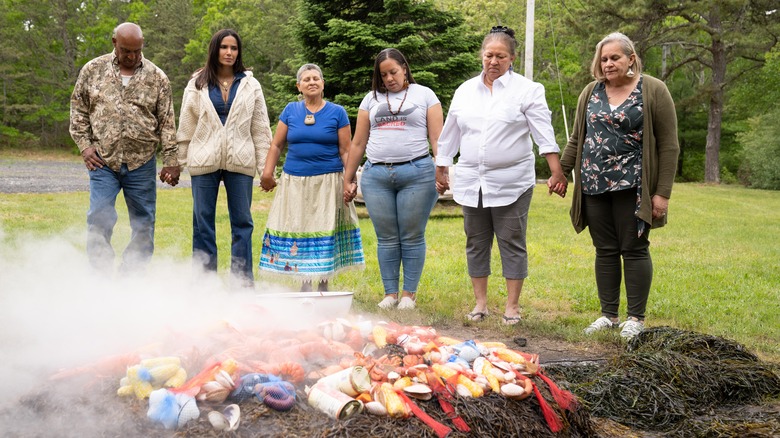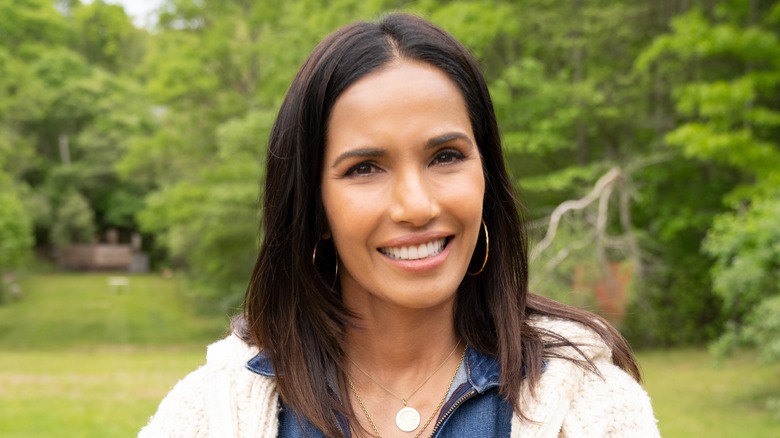Padma Lakshmi Dishes On The Newest Season Of Taste The Nation: Holiday Edition - Exclusive Interview
When you hear the word holidays, certain things automatically come to mind. Those things are different for each person, but for the most part, they all consist of some mix of memories, family traditions, and nostalgic comfort foods. Mix it all together, and you get the beautiful mosaic that is American culture. Perhaps no one understands this better than Padma Lakshmi. The writer, TV host, and food expert learned a thing or two about holiday customs in the U.S. while traveling the country for the newest season of her show, "Taste the Nation: Holiday Edition."
In this season, Lakshmi explores the foods and history behind the Jewish holiday of Hanukkah, Cuban Christmas in Miami, Korean celebrations of Lunar New Year, and the original Thanksgiving story. Each episode features delicious traditional foods that we all have to sit back and watch Lakshmi devour, while she learns the fascinating stories behind the holiday traditions celebrated all around America. And as "Taste the Nation: Holiday Edition" hits Hulu, Mashed got some exclusive inside details about the show.
Mashed spoke with Lakshmi, the host, creator, and executive producer, about the newest season of "Taste the Nation," including some of the delicious dishes she tried while filming the show, and what we can all learn about America's people and cultures through our shared holiday foods and traditions.
Padma Lakshmi on how Taste the Nation: Holiday Edition came to life
What was this experience like for you filming this holiday edition of "Taste the Nation?" What were some of the biggest takeaways for you?
I was just thankful to be able to go back and film some more episodes. I was worried that the pandemic would drag on for such a long time and that I wouldn't be able to deliver more episodes. We came, we filmed the first season before the pandemic, and then we premiered, in the middle of the pandemic in June. And then, I didn't know when we would go back to filming, and I wanted to make sure that our participants, as well as our crew and myself of course, could be safe but I was worried that I couldn't do the show. And so, rather than waiting until we could film all the episodes, I wanted to release these four right away, because I didn't want the show to go cold. That's the honest truth.
So we just thought, "okay, what spin can we put on it?" Since we're only doing four, rather than 10, like season one. And so we thought, "okay, holidays, it's a great window." To look at the holidays of a particular community, it's a great window to see what's important to them. How do they celebrate? Why do they celebrate? And all these things. So it turned out great for us. It's coming out during the holidays, we look at the holidays that are being celebrated by everyone right now. And it's fun, you see a lot of family dynamics, and you see things you wouldn't normally see on any normal Saturday evening, I guess.
Padma Lakshmi on what we can learn from American food traditions
What were some of the most important things that you learned throughout the filming process and things that you hope that the audience walks away with?
I learned so much during the show. I didn't know about Korean new year. I didn't know how elaborate of a ceremony and celebration it is because it takes place usually in a home. So I learned all about that, and they have these customs where they have an altar, and they make the favorite foods of their elders or their ancestors who are living or deceased. They do a full bow for blessings to older members of their family. You have to make this Tteokguk, which is this rice cake soup. And I learned how to cook all these Korean specialties. So I learned a lot about Korean culture and that holiday that I didn't know before doing my research for that episode.
I also learned a lot about the Thanksgiving myth that we were all told. I'm a product of the U.S. public school system. I remember those Thanksgiving plays and celebrations and the Pilgrims and the Indians and stuff. And a lot that is just a one-sided tale that we were told. And the real first Americans — one of the first nations of this land are the Wampanoag people who traditionally always lived in the Cape Cod, Massachusetts Rhode Island area with Martha's Vineyard, Cape Cod and northern Rhode Island — they've been around for 12,000 years and Western conquerors and settlers have only been here for five, 600 years. And so they have been keeping this land and preserving all the wildlife and rivers and oceans and streams and shores for eleven and a half thousand years before anybody else got here. So they have a lot to teach us about the environment and preserving our streams and rivers and beachfront that we can learn from.
All we were told is that, there was this first Thanksgiving, and it was all peaceful. We don't know that it was peaceful, that everybody brought stuff. And that's just one side of the story. So I think it's about time that we hear from the original Americans and their side of that story. I think that there's so many things that I learned that should be taught in every public school in this country, that I wish I had learned. The first Bible to ever be published, or printed and published in America, was not in English. It was in the Wampanoag language. I didn't know that. That's really useful information because American literature starts with, we are told, Jonathan Edwards and "Sinners in the Hands of an Angry God," and that ... those religious texts are how American literature and indeed all literature is born. And so that's a really important fact that I didn't learn in high school or middle school. And I certainly didn't learn it as an American lit major in college. And I should have.
How our Thanksgiving tables look different today, according to Padma Lakshmi
Another aspect of that Thanksgiving episode that is interesting is the actual foods that they eat, which are so similar to what we eat today. How different is Thanksgiving dinner today from what might have been served at some of the earliest Thanksgiving tables?
Well, we probably would be eating venison because the only thing that's true about that first Thanksgiving story that we've all been told year after year is that the indigenous people brought five deer with them to that big meal. They hunted and brought five whole deer because they were afraid they weren't going to have anything to eat because these settlers didn't know how to feed themselves, and we're starving. And so they brought those five deer.
So the original Thanksgiving meal is venison. And we wouldn't have had pork or beef there. We wouldn't have had stuffing made of bread because wheat is not indigenous to North American, indigenous culture, right. It was brought and cultivated later through colonialism. But a lot of the things like sweet potatoes, like lake corn, succotash ... beans, corn, squash, we would've eaten a lot of that. That's also...what's also available, in the fall and end of summer. Cranberries would've been there because they grew.
Sumac, which we nowadays usually associate with Middle Eastern cuisine, would've been used to season things because sumac was something that grew wild also in North America that had a lot of uses, but, yes, a seasoning ingredient also for the Navajo and Apache Indians who live in Arizona, which we featured last season in "Taste the Nation." So you would've seen me seasoning that pack rat with the sumac! Honey would've been prevalent.
A lot of things that we associate with Thanksgiving, like apple pie, not one thing is all American. Not one ingredient in apple pie is indigenous to North America, including the apples, or the cinnamon or the lard or the butter ... all of these things.
Padma Lakshmi dishes on one of her new favorite desserts
What are some of your favorite or the most interesting foods that you got to try while filming this season?
Well, one dessert that I learned how to make in that Wampanoag episode in Cape Cod is called a slump. And I'm not a big dessert maker. I'm totally a savory person. And so I don't make a lot of desserts, but I learned, I ate ... you see me eating it as I'm learning about the Bible and all this stuff about how they reintroduced their native language. I'm eating this blueberry slump. That slump is so delicious that I came home from filming in the summer. And I made that slump the very first weekend that I was home. It's so easy to do. And it's so concentrated and delicious and intense in blueberry flavor. And I encourage everybody to watch the episode and try to recreate it. It's pretty easy.
You can catch Padma Lakshmi in the newest season of "Taste the Nation: Holiday Edition" available to stream on Hulu starting November 4.
